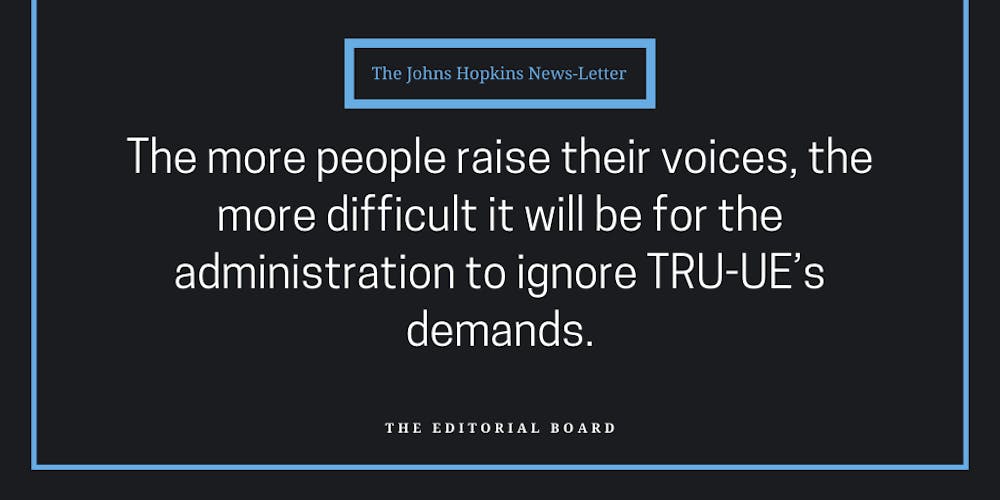Last week, the Hopkins graduate student union hosted a practice picket on both the Homewood and the East Baltimore campuses following nine months of failed contract negotiations with the University. Teachers and Researchers United (TRU) — affiliated with United Electrical, Radio and Machine Workers (UE) — demanded a contract that includes a closed union shop, recognition of the work done by graduate students and fair compensation and benefits.
The News-Letter applauded TRU-UE’s success when they became an official union last February, with a 97% majority vote, but we are disappointed that the University’s working conditions and compensation remain poor, especially given the institution’s substantial holdings.
In the University’s fiscal year 2022 financial report, Hopkins disclosed ending the year with an astounding surplus of $311 million. This value is nearly double the surplus of peer institutions like Yale. Thus, Hopkins can’t excuse its pitiful wages with a lack of funds.
Furthermore, Hopkins loves to boast of its decades-long ranking as the top-spending research institution in the U.S. — the gap between Hopkins and the next highest-spending university in fiscal year 2022 was around $1.6 billion. Yet, the administration has failed to adequately support the individuals conducting and facilitating much of that research. Our graduate students are indispensable contributors to the University's prestige as a research institution. Without them, research would undoubtedly ground to a halt across Hopkins.
Stipends for graduate students remain below the cost of living in Baltimore and have not been adjusted for inflation. A living wage for a single adult with no dependents in Baltimore is $42,485, yet the minimum stipend for PhD students in the Whiting School of Engineering is merely $37,600. TRU-UE is demanding that Hopkins improve its stipend to a livable wage, with annual increases that correspond with inflation or the rising estimated cost of living.
It is unacceptable for Hopkins to pay their graduate students less than the cost of living under any circumstances, but especially egregious when considered alongside the vast surplus that Hopkins has accumulated.
Beyond abysmal pay, Hopkins has a history of not paying its graduate students on time. Additionally, in terms of benefits, the School of Public Health did not provide its graduate students with dental or vision insurance until 2018. This change was only achieved after years of organizing.
Some of TRU-UE’s other demands include increased support for international students, safe and appropriate workspaces, reliable transportation infrastructure and a stronger commitment to Baltimore City. Part of their proposal includes an effective grievance procedure to address discrepancies in case the administration fails to live up to its promises.
We’ve seen TRU-UE rallies and protests on Homewood Campus, but what would a strike look like? If you need a concrete example, pay attention to other universities in the U.S. Two years ago, the Student Workers of Columbia University abstained from their duties in a 10-week strike. This ended in a 6% raise for workers with annual contracts and increased medical expense coverage.
At Hopkins, a TRU-UE strike would almost certainly disrupt the University’s operations. Classes might be canceled. Grades and exams could be delayed. But if a strike does occur, undergraduate students must support the union in their fight for improved working conditions.
This would not require you to abstain from your classes, or put your academic career on hold, but there are numerous ways you could help. For one, you could email administrators to advocate on behalf of your fellow students. You could even pester your professors. During a strike, graduate workers do not answer any communications concerning their assigned courses, so show your professors just how valuable their teaching assistants are: Send them emails about lectures and post Piazza questions on problem sets. Graduate students do the grunt work, and it’s time that all professors acknowledged that.
The more people raise their voices, the more difficult it will be for the administration to ignore TRU-UE’s demands. If you find yourself with questions, TRU-UE has provided strike guidelines for anyone to view.
Graduate students do so much for us — they explain physics problems, deliver philosophy lectures and answer our last-minute midterm questions. It is not an exaggeration to say that the Hopkins we know today would not exist without graduate students.
To professors and faculty: You were once graduate students, and today, your classes wouldn’t run without them. Support those who constantly support you. And to our peer undergraduates: The least we can do as an academic community is to show our solidarity and advocate for our fellow students.





